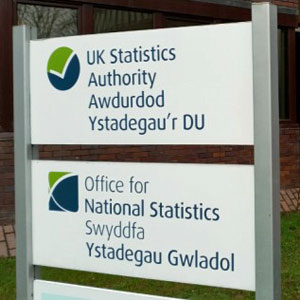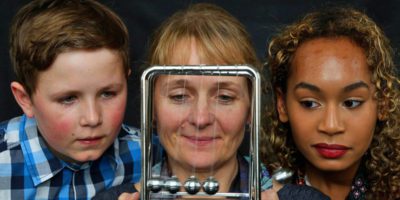Tanya Flower works as an assistant economist in the Office for National Statistics (ONS) in their Newport office, as part of the Civil Service Fast Stream. The Fast Stream is the Government’s flagship graduate development programme. She has worked on a number of analytical projects, including co-leading work on calculating inflation rates for different sub-groups of the population.

“…have confidence in yourself. Don’t let yourself be pigeon-holed. If there’s something that you want to do then just go for it. Don’t let anyone else’s perceptions hold you back…”
Standing out from the crowd through experience in unusual places
I graduated in July 2013 with an undergraduate degree in Maths and Economics from LSE [London School of Economics]. During university, I did several small work experience placements and shadowing to get experience, because these days it’s quite difficult to get good experience to put on job applications in order to stand out from the crowd.
I recommend looking for experience in unusual places. My dad suggested volunteering at the RSPB [Royal Society for the Protection of Birds] and over summer in first year I helped with some of their data analysis. I learnt a lot about working in a team and coordinating that side of the project work, and it helped my data analysis skills as well. That was really useful experience to talk about in my future interviews.
Also at university, I did a three-month summer placement in my second year with the Government Economic Service at the Department of Energy & Climate Change. It opened my eyes to the benefits of working in Government as an economist: it was incredibly interesting work and people were so friendly and supportive around the office.
After graduation, I took that summer off to travel. If you are lucky enough to have the opportunity to take a couple of months off and experience some of the world before you get into full time work, you should definitely take it. It’s great to have a bit of a break and it’s one of the best chances you’re going to get before you get stuck into your career. I wish I’d gone for longer!
My role at the Office for National Statistics

One of the main successes I’ve had is co-authoring an article which calculated inflation rates for different sub groups of the population, so looking at retired households, households with children, less affluent households, richer households – the whole spectrum. It was brilliant to be involved in – it was detailed analysis, and it’s since been used as a reference point for developing a new method of calculating inflation. Coming from university three years ago, I certainly didn’t expect I’d be able to get this far so soon.
One of the reasons I really enjoy working here is that you’re surrounded by such a wide range of people from so many different backgrounds, who are all so enthusiastic about their jobs. Having diverse teams is something the office is looking at closely, so we’re also trying to recruit more people (not just economists, but other analysts such as data scientists and statisticians) to digital professionals that can help develop new products alongside our new website.
On a day to day basis, my role is incredibly varied. We’ve got a strong economist community here at ONS, so there are lots of talks and events that we organise together. For instance, we’ve recently started up a debate series where we can discuss topical issues.
Another highlight was a three-week secondment I completed at ITN in London before the general election in 2015. I was particularly interested in how the media use our economic statistics, so I worked with ITV to see how they put together their news updates and I also worked with Channel 4 to see how our data was used on their website in their FactCheck blog. It was such a good experience – I was able to watch some of the actual news broadcasts from inside the control room!
It was fantastic to see the value they put on ONS statistics too. It’s always nice to know your work is appreciated as being dependable and trustworthy. Especially with the FactCheck blog, it was good to see that they felt they could give our data out to voters in advance of the general election as an independent source of evidence.
Unacknowledged, friendly competition to produce the most interesting stories

Another one of my previous roles was working on the Economic Review, which is a monthly article providing analysis on many of the ONS economic statistics. There’s an unacknowledged competition within the team to produce the most interesting graphs and to tell the most interesting narrative for the readers. People would gather round your desk to see how you put the graph together and learn from it: it’s a great, supportive environment.
The Fast Stream programme – challenging, but in a good way
The Fast Stream is the main graduate development programme for Government. It aims to provide Fast Streamers with the skills and training they require to become effective future leaders. The programme is four to six years in length, and within that period you work in a number of different roles which provide you with the different experience required to move forward effectively.
You’re encouraged to switch between departments and teams so you can explore the different areas before you decide on the one you want to specialise in. It’s been great to learn what I can do and to see what I’m most interested in before I think about specialising in the future.
Within ONS itself, we have quite an active Fast Stream community. I’m chair of the Fast Stream Committee, and we organise loads of events for the community, including talks from John Pullinger, our National Statistician, and some of the other senior civil servants. We’ve also organised a conference for and with other Fast Streamers within Wales. There are a number of different Government departments in the area, so it’s great to develop an active network and to learn what colleagues do. It’s also easier to arrange secondments and loans when you have an active network.
The Fast Stream posts can be quite challenging, but in a good way. It’s very rewarding, especially here at ONS where we’re at the forefront of developing new ways of using alternative data sources in our statistics or different ways of measuring how the economy produces its output.
Recruitment process for economists
The Fast Stream recruitment process can be quite daunting, but there’s a lot of support out there and it is worth it because it’s such a good job.
There are two assessment centres for assistant economists. You have to do the Economist Assessment Centre (EAC), which tests you on your economics skills, and then the Fast Stream Assessment Centre (FSAC), which is more about general skills like management, teamwork and communication. If you do some googling, there’s a number of websites out there that have information on what kind of exercises come up during these assessment centres.
There are also lots of other options out there if you’re not successful at passing the Fast Stream first time. For example, if you pass the EAC but don’t quite make the grade on the FSAC, you can be taken on as a provisional economist. Last year, ONS hired around 15 provisionals and supported them through their application to the Fast Stream at the next given opportunity. From that 15, the majority were successful and continue to work at ONS or at other government departments.
Also, if you miss the deadline for the Fast Stream (it’s only run twice a year), ONS do a direct recruitment scheme for economists as well. Again, that’s a fantastic opportunity for graduates to secure a graduate level job on a two year contract, and the ONS supports you through your application to get on to the Fast Stream.
We’re running another direct recruitment round later on this year. It will be advertised on the Civil Service Jobs website and we’ll also be going round some of the university careers fairs to talk about the vacancies as well, so keep an eye out for that!
Improving gender balance and encouraging a diverse workforce
When I started, Jil Matheson was our National Statistician so from the beginning there was strong female leadership within the organisation. There weren’t so many women within the economics team, but that’s developed a lot since I’ve been here. There are a number of women working alongside me and in other teams around the office.
That includes a lot of students who have come in on placements, so we’re building a strong base to work from. We’ve also got more women in senior positions now – you’ve already interviewed Heather Savory, the Deputy National Statistician for Data Capability. We’ve also got a lot of other women in senior positions around the office responsible for many high profile outputs. It’s so inspiring to see how well they’ve done and they’re extremely supportive and encouraging for those of us starting out in our careers.
How the ONS is supporting flexible and modern ways of working
Like most of the Civil Service we have flexi time here, which is amazing! It means that you don’t have to work the core 9-5 hours, and you have a lot more flexibility to build work around whatever is going on in your life. So if you have a family you can arrange it around childcare and school hours.
For me, it’s nice because I can incorporate longer weekends and travelling. My friend has just come back from three weeks in Nicaragua. There’s a lot of flexibility as long as you’re sensible about planning your work around your break – so you don’t take time off in the middle of a key production round for example!
There’s also support available at ONS if you wanted to do part time study. A couple of my friends on the scheme are getting funded for part time Masters [degrees] from their divisions. There’s a big focus from senior management on up-skilling the workforce, and the development of key skills such as analytical ability is very important here. For part time study, you obviously still have to work your hours but they will let you have time off around exams, for example or if you’ve got an important piece of coursework. It’s a really flexible way of working.
Advice for women and girls considering careers in maths and statistics
The best presentations I’ve seen always have three key points, or three main messages to take away, so I’ll try to emulate that and give you three points of advice!
The first thing came from John Pullinger, our National Statistician. He gave a talk when I first joined ONS in which he said especially in the early stage of your career, or if you’re at university and just starting out, just say ‘yes’ to every opportunity (which is really why I’m sat here doing this interview!).
The second point is to just have confidence in yourself. Don’t let yourself be pigeon-holed. If there’s something that you want to do then just go for it. Don’t let anyone else’s perceptions hold you back.
And thirdly, and perhaps controversially for some, my advice is don’t feel like you have to work in London. I spent three years there at university and there are lots of opportunities, but don’t have that as your be all and end all. There is so much to discover elsewhere in the UK.
Here in Newport for example, we’re developing as the hub of statistical excellence for the UK. There really are so many other opportunities around the area as well in terms of other Government departments.

Newport is under-sold but there are so many benefits! The Brecon Beacons are right on your doorstep, and if you miss London too much it’s only two hours away by train. And it’s so cheap: what I’m paying on my house now is about a third of what I was paying when I was renting in London, and this is a whole house, with a garden, as opposed to a room in a three bed flat! Cardiff is also only 20 minutes away so a lot of people who work at the ONS live there, so you get all the benefits of a capital city but without the cost.
Coming up next for me and the ONS
I’ve recently started as the project lead for the web scraping prices project. This is part of the ONS drive to innovate: exploring ways to incorporate lots of new alternative data sources into the production of our statistics.
The web scrapers are programmed in the open-source software, Python, using the Scrapy module, and they collect around 6,500 prices daily from three online retailers. This is a really rich source of data and we’re now looking at ways to incorporate this and other web scraped data into the production of our consumer price statistics. For example, after collecting the data we’re doing a lot of data wrangling (i.e. cleaning the data set and classifying the data into items that are then used to calculate experimental price indices).
It’s quite challenging because I’m learning a lot of new skills with the software programming, but everyone’s so supportive and there are lots of training opportunities available. We produced a summary article of the work that we’ve done so far in September last year and we’re producing an update for that at the end of May.
Infographic by Office for National Statistics (ONS)
There are so many opportunities to get involved in – it really is a great time to be here. For example, I’m going to be presenting on the web scraping project at the UN CPI [Consumer Price Index] Experts Group meeting in Geneva, which is something that three years into my career I didn’t even imagine would be possible! As part of that as well there are lots of opportunities for promotion and building your experience.
As Heather mentioned in her interview, there is lots of workforce transformation taking place at ONS, and even being here at the beginning of my career there are so many opportunities for new projects that you can get involved in if you want experience elsewhere.
http://www.ons.gov.uk/ons/index.html
https://www.linkedin.com/company/office-for-national-statistics






